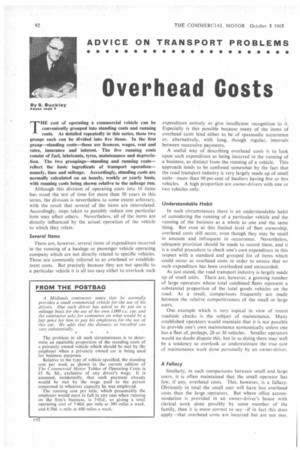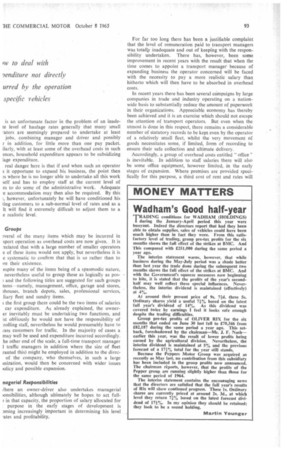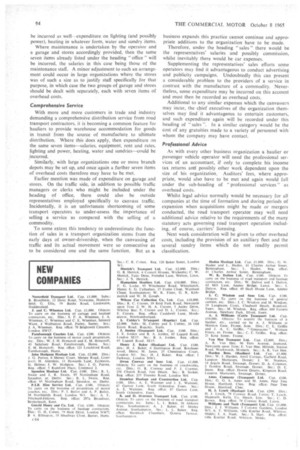Overhead Costs
Page 94

Page 95

Page 96

If you've noticed an error in this article please click here to report it so we can fix it.
ow to deal with
7enditure not directly urred by the operation speci c vehicles THE cost of operating a commercial vehicle can be conveniently grouped into standing costs and running costs. As detailed repeatedly in this series, these two groups each can be divided into five items. In the first group—standing costs—these are licences, wages, rent and rates, insurance and interest. The five running costs consist of fuel, lubricants, tyres, maintenance and depreciation. The two groupings—standing and running costs— reflect the basic ingredients of transport operation— namely, time and mileage. Accordingly, standing eosts are normally calculated on an hourly, weekly or yearly basis, with running costs being shown relative to the mileage run.
Although this division of operating costs into 10 items has stood the test of time for more than 50 years in this series, the division is nevertheless to sonic extent arbitrary, with the result that several of the items are interrelated. Accordingly, steps taken to possibly reduce one particular item may affect others. Nevertheless, all of the items are directly influenced by the actual operation of the vehicle to which they relate.
Several Items
There are, however, several items of expenditure incurred in the running of a haulage or passenger vehicle operating company which are not directly related to specific vehicles. These are commonly referred to as overhead or establishment costs. But precisely because they are not specific to a particular vehicle it is all too easy either to overlook such expenditure entirely or give insufficient recognition to it. Especially is this possible because many of the items of overhead costs tend either to be of spasmodic occurrence_ or, alternatively, with long, though regular, intervals between successive payments.
A useful way of describing overhead costs is to look upon such expenditure as being incurred in the running of a business, as distinct from the running of a vehicle. This approach tends to be confused somewhat by the fact that the road transport industry is very largely made up of small units—more than 90 per cent of hauliers having five or less vehicles. A high proportion are owner-drivers with one or two vehicles only.
Understandable Habit
In such circumstances there is an understandable habit of considering the running of a particular vehicle and the running of the business as a whole as one and the same thing. But even at this limited level of fleet ownership, overhead costs still occur, even though they may be small in amount and infrequent in occurrence. Nevertheless, adequate provision should be made to record these, and it is a useful procedure to check one's own expenditure in this respect with a standard and grouped list of items which could occur as overhead costs in order to ensure that no such expenditure has been overlooked and unrecorded.
As just stated, the road transport industry is largely made up of small units. There are, however, a growing number of large operators whose total combined fleets represent a substantial proportion of the total goods vehicles on the road. As a result. comparisons frequently are made between the relative competitiveness of the small or large users.
One example which is very topical in view of recent roadside checks is the subject of maintenance_ Many established operators would maintain that it is not possible to provide one's own maintenance economically unless one has a fleet of, perhaps, 20 or 30 vehicles_ Smaller operators would no doubt dispute this, but in so doing there may well be a tendency to overlook or underestimate the true cost of maintenance work done personally by an owner-driver.
A Fallacy
Similarly, in such comparisons between small and large users, it is often maintained that the small operator has few, if any, overhead costs. This, however, is a fallacy. Obviously in total the small user will have less overhead costs than the large operators. But where office accommodation is provided in an owner-driver's house with clerical work done possibly by some member of the family, then it is more correct to say—if in fact this does apply—that overhead costs are incurred but are not met.
is an unfortunate factor in the problem of an inadete level of haulage rates generally that many small ,ators are seemingly prepared to undertake at least jobs, combining manager and driver and possibly
r in addition, for little more than one pay packet. ilarly, with at least some of the overhead costs in such laces, household expenditure appears to be subsidizing lage expenditure.
real danger here is that if and when such an operator s it opportune to expand his business, the point then :s where he is no longer able to undertake all this work self and has to employ staff at the current level of es to do some of the administrative work. Adequate e accommodation may then also be required. By this ;, however, unfortunately he will have conditioned his Ling customers to a sub-normal level of rates and as a It will find it extremely difficult to adjust them to a e realistic level.
Groups .veral of the many items which may be incurred in sport operation as overhead costs are now given. It is -eeiated that with a large number of smaller operators e of these items would not apply, but nevertheless it is e systematic to confirm that that is so rather than to ire their existence.
espite many of the items being of a spasmodic nature, nevertheless useful to group these as logically as pos: and the following titles are suggested for such groups terns --namely, management, office, garage and stores, houses, branch depots, sales, professional services, liar)' fleet and sundry items.
t the first group there could be the two items of salaries car expenditure. As already explained, the ownerer inevitably must be undertaking two functions, and Lst obliiously he would not have the responsibility of Tolling staff, nevertheless he would presumably have to /ass customers for traffic. In the majority of cases a may well be used and expenditure incurred accordingly. he other end of the scale, a full-time transport manager traffic managers in addition where the size of fleet ranted this) might he employed in addition to the direcof the company, who themselves, in such a large inization, would then be concerned with wider issues ■ olicy and possible expansion.
nagerial Responsibilities
There an owner-driver also undertakes managerial lonsibilities, although ultimately he hopes to act full: in that capacity, the proportion of salary allocated for purpose in the early stages of development is 3ming increasingly important in determining his level .ates and profitability.
For far too long there has been a justifiable complaint that the level of remuneration paid to transport managers was totally inadequate and out of keeping with the responsibility undertaken. There has, however, been some improvement in recent years with the result that when the time comes to appoint a transport manager because of expanding business the operator concerned will be faced with the necessity to pay a more realistic salary than hitherto which will then have to be absorbed in overhead costs.
In recent years there has been several ca:mpaigns by large companies in trade and industry operating on a nationwide basis to substantially reduce the amount of paperwork in their organizations. Appreciable economy has thereby been achieved and it is an exercise which should not escape the attention of transport operators. But even when the utmost is done in this respect, there remains a considerable number of statutory records to be kept even by the operator of a relatively small fleet, whilst the very movement of goods necessitates some, if limited, form of recording to ensure their safe collection and ultimate delivery.
Accordingly, a group of overhead costs entitled " office" is inevitable. In addition to staff salaries there will also be some office equipment, however limited, in the early stages of expansion. Where premises are provided specifically for this purpose, a third cost of rent and rates will be incurred as well—expenditure on lighting (and possibly power), heating in whatever form, water and sundry items.
Where maintenance is undertaken by the operator and a garage and stores accordingly provided, then the same seven items already listed under the heading " office " will be incurred, the salaries in this case being those of the maintenance staff. A minor adjustment to such an arrangement could occur in large organizations where the stores was of such a size as to justify staff specifically for that purpose, in which case the two groups of garage and stores should be dealt with separately, each with seven items of overhead costs.
Comprehensive Service With more and more customers in trade and industry demanding a comprehensive distribution service from road transport contractors, it is becoming a common feature for hauliers to provide warehouse accommodation for goods in transit from the source of manufacture to ultimate distribution. Where this does apply, then expenditure on the same seven items—salaries, equipment, rent and rates, fighting and power, heating, water and sundries—could be incurred.
Similarly, with large organizations one or more branch depots may be set up, and once again a further seven items of overhead costs therefore may have to be met.
Earlier mention was made of expenditure on garage and stores. On the traffic side, in addition to possible traffic managers or clerks who might be included under the heading of office, there could also be outside representatives employed specifically to canvass traffic. Incidentally, it is an unfortunate shortcoming of some transport operators to under-assess the importance of selling a service as compared with the selling of a commodity.
To some extent this tendency to underestimate the function of sales in a transport organization stems from the early days of owner-drivership, when the canvassing of traffic and its actual movement were so consecutive as to be considered one and the same function. But as a business expands this practice cannot continue and appropriate additions to the organization have to be made.
Therefore, under the heading "sales" there would be the representatives' salaries and possibly commission, whilst inevitably there would be car expenses.
Supplementing the representatives' sales efforts some operators may find it advantageous to conduct advertising and publicity campaigns. Undoubtedly this can present a considerable problem to the providers of a service in contrast with the manufacture of a commodity. Nevertheless, some expenditure may be incurred on this account and must then be recorded as overhead costs.
Additional to any similar expenses which the canvassers may incur, the chief executives of the organization themselves may find it advantageous to entertain customers, and such expenditure again will be recorded under this heading of "sales ". In a similar category would be the cost of any gratuities made to a variety of personnel with whom the company may have contact.
Professional Advice As with every other business organization a haulier or passenger vehicle operator will need the professional services of an accountant, if only to complete his income tax returns and possibly other work dependent upon the size of his organization. Auditors' fees, where appropriate, would also have to be met and again would fall under the sub-heading of "professional services" as overhead costs.
Whilst legal advice normally would be necessary for all companies at the time of formation and during periods of expansion when acquisitions might be made or mergers conducted, the road transport operator may well need additional advice relative to the requirements of the many statutory acts governing road transport operation including, of course, carriers' licensing.
Next week consideration will be given to other overhead costs, including the provision of an auxiliary fleet and the several sundry items which do not readily permit classification.


















































































































































